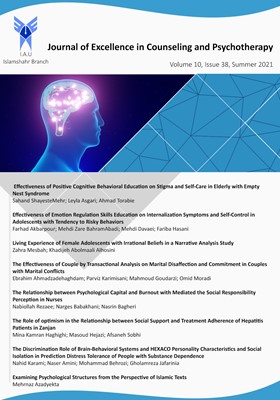Effectiveness of Positive Cognitive Behavioral Education on Stigma and Self-Care in Elderly with Empty Nest Syndrome
Subject Areas : Journal of Excellence in Counseling and PsychotherapySahand ShayesteMehr 1 , Leyla Asgari 2 , Ahmad Torabie 3 *
1 - MA of Clinical Psychology, Department of Psychology, Marand Branch, Islamic Azad University, Marand, Iran
2 - MA of General Psychology, Department of Psychology, Mahallat Branch, Islamic Azad University, Mahallat, Iran
3 - MA of Clinical Psychology, Department of Psychology, Sari Branch, Islamic Azad University, Sari, Iran
Keywords: stigma, elderly, empty nest syndrome, Self-care, Positive Cognitive Behavioral Education,
Abstract :
Purpose: The aim of this study was to determine the effectiveness of positive cognitive behavioral education on social stiffness and self-care in the elderly with empty nest syndrome. Methodology: The present study was a quasi-experimental with pre-test and post-test design with a control group. The research community of the elderly with empty nest syndrome had psychological problems referring to counseling centers and psychological services in Sari in 2020. After examining the inclusion criteria, 40 elderly people were selected by purposive sampling method and randomly replaced in experimental and control groups (20 people in each group). The experimental group underwent 8 sessions of 75 minutes (one session per week) in positive cognitive-behavioral training and the control group did not receive training. The research instruments were the King et al stigma questionnaire (2007) and Younesi Borujeni et al elderly self-care scale (2020). Data were analyzed by Chi-square, independent t-test and multivariate analysis of covariance in SPSS-25 software. Findings: The results of independent t-test showed that the experimental and control groups in the pre-test stage were not significantly different in terms of social heat and self-care (P> 0.05), but in the post-test stage both variables were significantly different (P˂0.001). . Also, the results of multivariate analysis of covariance showed that positive cognitive behavioral training reduced social stiffness and increased self-care of the elderly with empty nest syndrome (P˂0.001). Conclusion: According to the results of this study, elderly health professionals and therapists can use positive cognitive behavioral education to improve the psychological characteristics of the elderly, especially to reduce social stiffness and increase self-care in the elderly with empty nest syndrome.
_||_

